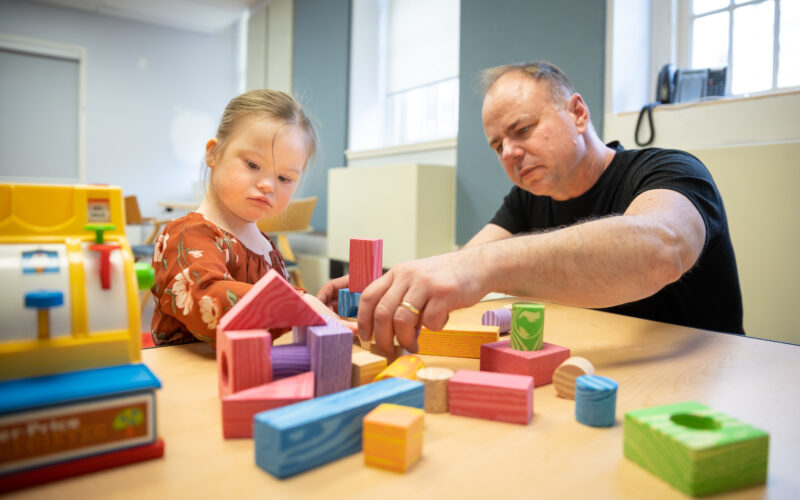Selecting a quality service provider to oversee your child’s intensive behavioural intervention (IBI) program is an important responsibility for families. IBI is a broad developmental treatment used to support learning for people with autism. An IBI program is developmental in sequence, focusing on skills in the order they would typically to appear in developing children. An individualized curriculum is designed to improve learning in the key areas of cognitive, language and social development.
Your child has a learning profile that is unique to them. A quality IBI program uses assessment results to inform curriculum targets. A behavioural intervention curriculum is broad in scope and targets a range of developmental areas.
What assessments are used to create a student’s Individual Program Plan (IPP)?
Your service provider will use at least one of the following assessment tools.
- Assessment of Basic Language and Learning Skills – Revised (ABLLS-R)
- Verbal Behavior Milestones Assessment and Placement Program (VB-MAPP)
- Psycho-educational assessments
When is the IPP provided to parents to review?
An initial IPP should be provided within the first 30 days of treatment.
Can parents add their input at an IPP meeting?
Yes, parents can add input to their child’s IPP before, during or after the meeting.
What can be added to the IPP?
Parents can add anything to their child’s IPP that they feel is important to their child and family. This could be information related to short and/or long-term goals. Some providers may incorporate parent input at the time of the IPP meeting, others may discuss goal setting before the IPP is created.
How will the program be individually tailored to meet the needs of my child?
Your provider will create an IPP based on the assessments conducted, direct observation and discussion with you. A program will be created that is based on a functional sequence of skills and fits with your child’s current level of functioning. The ultimate goal of this intervention is to increase your child’s rate of learning.
What domains or program areas are covered in the IPP?
- The IPP is a comprehensive document. It will include programming across a wide range of curriculum areas. Programming will not just focus on one or two developmental domains.
- Comprehensive developmental domains can include, but are not limited to the following: attending, functional communication, expressive language, receptive language, matching/visual performance, fine motor skills, gross motor skills, imitation skills, personal care skills, pre-academic skills, school participation skills, play skills and social skills.
How often is the IPP updated?
The Autism Intervention Program Guidelines require that IPPs be updated minimally every 6 months.
How do you manage and reduce challenging behaviour?
Your service provider will adopt a functional approach to address behaviours that may interfere with your child’s learning. These types of behaviours may be called challenging or inappropriate. This functional approach will include a baseline assessment to help determine if a more formal Behaviour Support Plan is required. Your service provider will conduct further assessments to help determine the reason why/ function behind why your child is engaging in these behaviours. If a Behaviour Support Plan is required, it will focus on reducing the challenging behaviour as well as building skills. Prior to implementing a Behaviour Support Plan, we will obtain your consent to proceed accordingly.
How do you include parents in programming?
Parents play a key role in helping their child generalize skills learned through IBI into other environments. Parents and service providers will work together to ensure skills learned in one environment are able to be demonstrated in other environments.
Do you collect data to assess my child’s performance?
Yes. Your service provider will collect data on a number of different areas including skills that your child is learning and has already learned. Data will also be collected on behaviour reduction.
How often is data collected?
Data is collected frequently throughout the day/session.
How is data used?
Data collected is used in order to help your service provider determine if what is being taught is being learned.
How will progress or lack thereof be evaluated?
Your service provider will have documented revision criteria that will inform their decisions about how to adjust the program to ensure your child is learning at their best.
IBI is a direct treatment. Research supports implementation by well-trained, well-supervised staff. Some providers hire their own staff, while others supervise/train staff that are hired by the family. Staff should be trained in both the theoretical principles of applied behaviour analysis (ABA) and the practical teaching methods of IBI. This training should not be “one time” but; staff should acquire ongoing professional development. Staff training should also include mandatory reporting such as duty to report/CAS.
Do you currently have an approved contract with Surrey Place?
Yes.
Is your Clinician-in-charge approved as a Direct Funding Option (DFO) provider on a case-by-case basis?
Yes.
What experiences and credentials does this service provider have (e.g., years of supervised practice, number of individuals with autism served, types of behaviour treated, etc.)?
The Clinician-in-charge should have specific training, supervision and extensive clinical experience in provision and supervision of IBI for young children with autism. If you ask the clinician you are considering to provide you with their clinical resume, then you may receive more information about their experience in these areas.
Please briefly describe your staff training model
Your service provider will describe a comprehensive training model that includes both new staff training as well as ongoing training.
Is the program supervised by a Board Certified Behavior Analyst (BCBA)?
Yes.
Does a regulated health professional (e.g., Clinical Psychologist) oversee the program?
Yes (name should be provided).
What is the frequency of live supervision with the child in therapy by the Clinician in Charge?
A minimum of once per month.
What is the frequency of live supervision with the child in therapy by the Senior Therapist?
A minimum of once every week. Your provider should be able to adjust supervision to best meet your child’s needs.
Parents have an important role on their child’s treatment team. A service provider should offer parent training in a variety of formats.
Do you offer parent training? How often?
The service provider should outline parent training opportunities that cover information on autism in general as well as child-specific teaching strategies.
Are parents able to observe their child in IBI? How often?
Yes. The provider should describe how this can be arranged.
How does the provider communicate with the parents?
The Service Provider should have practices that involve regular communication with the family. This may be in the form of a regularly scheduled phone/face to face meetings or a daily Communications book that is filled out by the IBI staff. Daily communication may include successes, challenges, changes made to the program and any observation/comments that may be useful for the family. In addition, next visit dates by the clinician in charge and senior therapist are noted.
Procedural Questions/Intake:
- How do you apply for admission into your program?
- Do you have a waitlist?
- Will there be an intake interview to determine eligibility?
- What are the costs of the program?
- Are there costs not included in the service agreement?
- Do you charge extra for each updated curriculum assessment?
- What does the tuition cover in terms of services provided?
- Do you offer part time placement?
- Is the cost of materials covered?
- Am I expected to be home while service is occurring?
- What is your cancellation policy?
- What is your termination policy?


